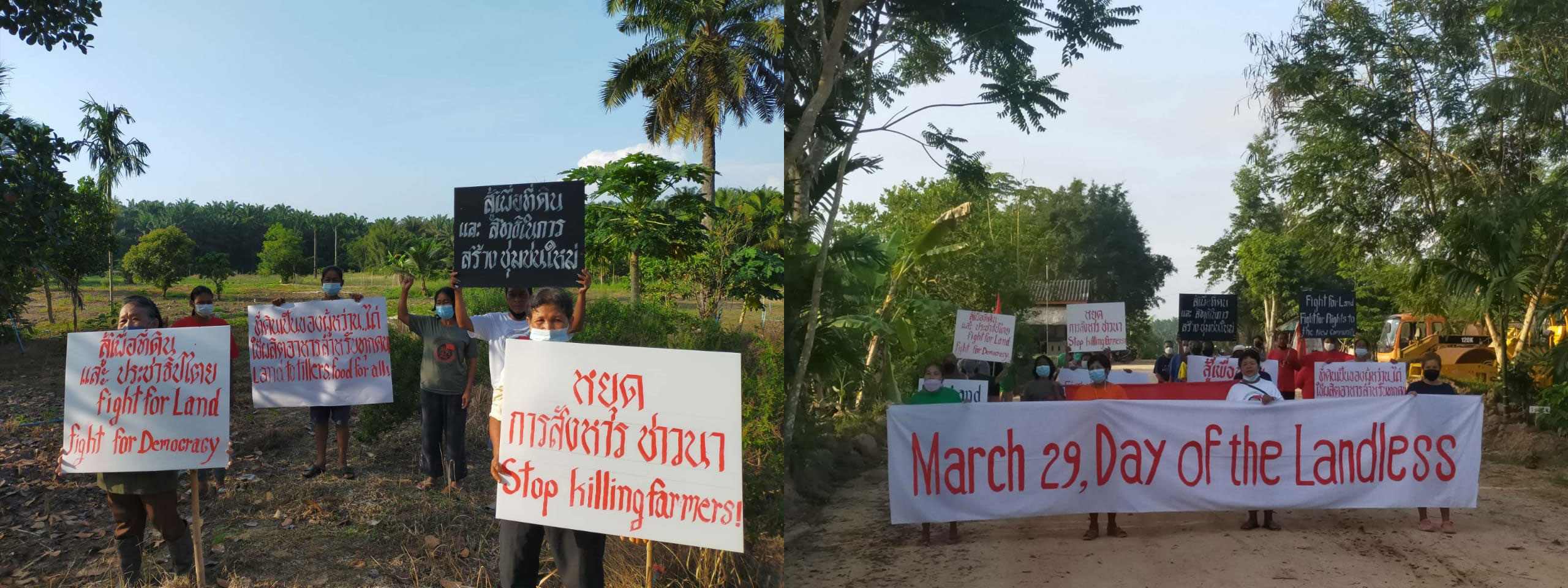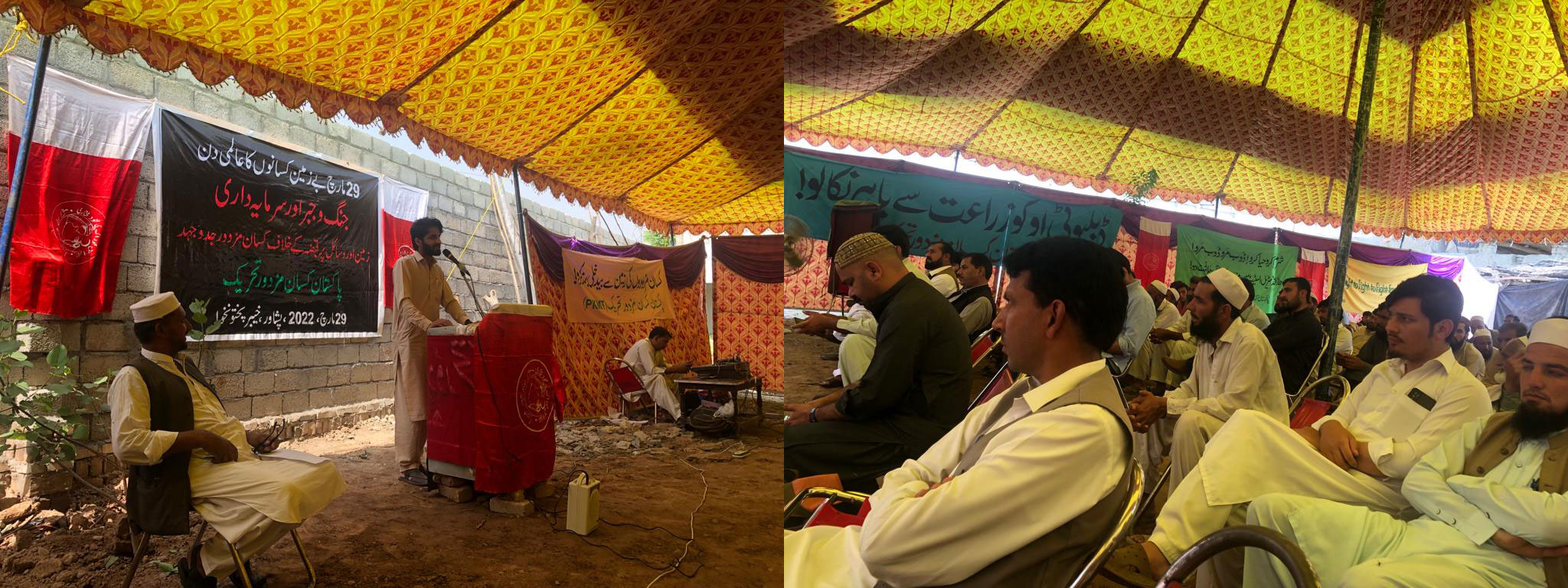We, the peasant movements, food sovereignty advocates, and supporters of genuine agrarian reform around the world, mark this year’s Day of the Landless enraged by the renewed push of big corporations, the rich governments representing them, and the governments of poor countries subservient to foreign and private capital of their land grabbing and greenwashing schemes in the pretext of climate change mitigation and sustainable food systems.
We have seen how they actively promoted nature-positive production during the UN Food Systems Summit (UN FSS) discussions. We have seen how they tried to insert nature-based solutions in the UN Climate Change Conference of the Parties (COP26).
These machinations aim to hide the corporations’ and rich countries’ accountability in destroying the environment and aggravating the climate crisis. They are also a ploy to concentrate further the world’s farmlands, forests, and other resources in the hands of profit-oriented interests.
In the name of ecosystem conservation, farming and indigenous communities are being driven away from their farmlands and ancestral territories. Corporations finance big conservation groups to enclose forests and expand monoculture farms and tree plantations. Instead of reducing the greenhouse gas (GHG) emissions from their pollutive business operations, corporations use such investments to supposedly offset the climate harm they cause.

These projects involve a ludicrous size of lands that are the source of livelihood and part of the cultural identity for rural peoples. To illustrate, the oil and energy giants would require a whopping 500 million hectares of farmlands for their net-zero GHG targets even as they continue to pollute the planet.
So-called green energy investments like biofuels are getting a renewed boost with the further legitimization of the global carbon trading market. To meet their climate targets, industrialized nations like the European Union (EU) and the US promote the production of biofuels through mandated use in transport and the provision of fiscal incentives. While investors claim that most biofuel projects utilize unoccupied or marginal lands, empirical research shows otherwise. Many of these lands are inhabited, forested, used for grazing, or used as a communal resource.
Another area of purportedly sustainable land investment is ecotourism, which has been rising as an industry by about 10% a year in the past two decades due to a growing demand for “nature-based tourism.” Ecotourism aims to promote responsible travel to natural areas for environmental conservation, sustain local people’s wellbeing, and increase awareness of ecological issues. However, the industry has been a significant driver of rural people’s displacement to give way to ecotourist enclaves. Profit-motivated conservation projects and ecotourism investments to supposedly protect marine resources also often deprive small fishing communities of their livelihood and even cause their physical displacement.
The increasing financialization of the global economy and the digitalization of food and agriculture is creating a more encouraging environment for these forms of land grabs in the name of nature to thrive further. Financial firms that manage the scandalous wealth of the world’s wealthiest billionaires are turning to farmland investments as green, sustainable, and socially responsible. Such investments are peddled as carbon offsets for the billionaires’ environmentally harmful businesses and include projects known to have displaced rural communities. Meanwhile, financial players rely on data mined from farms by drones or mobile apps to determine which lands are most profitable or suitable for their so-called green investments.

Additionally, the ongoing COVID-19 pandemic continues to deepen the contradictions between the land and resource grabbers — the monopoly capitalists, finance oligarchs, local compradors, landlords, and bureaucrats — and the farmers, farmworkers, fishers, indigenous people, rural women and youth, and other rural sectors. The health crisis that the novel coronavirus created has spawned new levels of global poverty and hunger that primarily impact rural peoples. Aggravating this are the wars and conflicts perpetrated by the competing interests of big global powers. The war in Ukraine that is being driven by the US-Russia rivalry, for instance, is exacerbating the already very dire situation of global hunger and food insecurity. The shockwave generated by the pandemic and the worsening socio-economic conditions of billions worldwide widened structural social inequalities, with the ruling classes increasingly resorting to fascist and dictatorial measures to maintain their power amid massive social unrests.
All this fuels more conflicts and struggles for land and resources worldwide. But with increasing economic and political power at their disposal amid rising fascism and the worsening global crisis, the land and resource grabbers resort to even more repression of rural communities defending their rights. The result is a deteriorating human rights situation for the rural peoples who face extrajudicial killings, arrests, and detention based on trumped-up charges and other forms of persecution.
In the past five years, at least 560 people were killed in relation to land struggles and conflicts worldwide. Almost half of that total (230) were farmers and farmworkers, while 188 were indigenous people and 124 were land activists. State forces were involved in one-third of these killings, while almost two-thirds were unidentified perpetrators, making the demand for accountability even more difficult. Cases involving private goons or security personnel mostly were sanctioned by the state. Meanwhile, there were about 2,357 victims of arrests and detention and 585 victims of threats, harassment, and physical assault.[1]

We strongly condemn these blatant attacks.
We are unfazed by the increasing violence that repressive governments and profit-motivated interests are wreaking upon our movements and communities. We shall continue to rise up against land grabbing and fascist attacks to defend our right to land and life. We commit to invigorate our global campaign to stop human rights abuses against farmers and other rural peoples, including the political killings, and hold the perpetrators accountable for their atrocious crimes.
We vow to strengthen our solidarity with all the local communities in exposing and fighting land grabs in the guise of mitigating the climate crisis and promoting sustainable food and agricultural production. We shall continue our efforts to build a solid global people’s movement that will resolutely undertake the struggle to establish food systems based on the people’s rights to land and resources and a healthy planet.
Stop land grabs in nature’s name!
Stop the fascist attacks and human rights violations against rural peoples!
Stop killing farmers!
Advance just, equitable, healthy, and sustainable food systems!
Genuine agrarian reform now!
The following organizations endorse this unity statement to mark the Day of the Landless 2022:
Global and regional networks, alliances, and institutions
- Asian Peasant Coalition (APC)
- People’s Coalition on Food Sovereignty (PCFS)
- Coalition of Agricultural Workers International (CAWI)
- International League of Peoples’ Struggle (ILPS) Commission 6
- PAN Asia Pacific (PANAP)
- Arab Group for the Protection of Nature (APN)
- Arab Network for Food Sovereignty (ANFS)
- Asia Development Alliance
- Asia Indigenous Peoples Network on Extractive Industries and Energy (AIPNEE)
- Asia Pacific Forum on Women, Law and Development (APWLD)
- Asia Pacific Mission for Migrants
- GRAIN
- IBON International
- International League of Peoples’ Struggle (ILPS)
- International League of Peoples’ Struggle (ILPS) Commission 10
- Indigenous Peoples Global Forum for Sustainable Development (IPGFfoSD)
- International Indigenous Peoples Movement for Self-Determination and Liberation (IPMSDL)
- Keduzi
- Merdeka West Papua Support Network
- News
- Pacific Disability Forum
- Peace for Life
- Possible Futures
- Reality of Aid – Asia Pacific
- Youth for Food Sovereignty (YFS)
National and local organizations
- A Growing Culture, United States of America
- Agroecology X, Philippines
- Aid/Watch, Australia
- Aliansi Gerakan Reforma Agraria (AGRA), Indonesia
- All Nepal Peasants’ Federation (Revolutionary Centre), Nepal
- Alyansa ng Magbubukid sa Bulacan, Philippines
- Alyansa ng Magbubukid sa Gitnang Luzon, Philippines
- Alyansa Tutol sa Importasyon, Philippines
- AMIHAN National Federation of Peasant Women, Philippines
- Andhra Pradesh Vyavasaya Vruthidarula Union (APVVU), India
- ASTM, Luxembourg
- Bantay Bigas, Philippines
- Cambodia’s Independence Civil-Servants Association (CICA), Cambodia
- CECOEDECON, India
- Center for Women’s Resources, Inc., Philippines
- Centre for Sustainable Development and Environment, Iran
- CENWOR, Sri Lanka
- Climate Justice Alliance, United States of America
- Climate Watch Thailand, Thailand
- Coalition of Cambodian Farmers Community (CCFC), Cambodia
- Coastal Development Partnership , Bangladesh
- Concertation Nationale des Organisations Paysannes du Cameroun (CNOP-CAM), Cameroon
- Cordillera Peoples Alliance, Philippines
- Danggayan Dagiti Mannalon ti Cagayan Valley (Cagayan Valley Peasant Alliance), Philippines
- Empower India, India
- Farmer Affairs Network, Myanmar
- Farmworker Association of Florida, United States of America
- Fiji women network, Fiji
- Freelance activism, Bangladesh
- Frente Campesino Luis Beltrán Prieto Figueroa, Venezuela
- Good Food Community, Philippines
- Homestead Organics Farm, United States of America
- Humabol Bohol, Philippines
- Human Unity Movement (HUM) , Pakistan
- Institute for National and Democracy Studies (INDIES), Indonesia
- Instituto Politecnico Tomas Katari (IPTK), Bolivia
- Joint Action for Water, India
- Kalipunan ng mga Samahang Magsasaka sa Kabite, Philippines
- Kasama TK, Philippines
- KASAMMA-KO, South Korea
- Katipunan ng mga Lehitimong Magsasaka at Mamamayan sa Lupang Ramos (KASAMA-LR), Philippines
- Katribu Youth, Philippines
- Kilusang Magbubuik ng Pilipinas (KMP), Philippines
- Kilusang Magbubukid ng Bikol, Philippines
- KMP Bikol, Philippines
- KMP Negros, Philippines
- KMP Socsargends, Philippines
- Magsasaka at Siyentipiko para sa Pag-unlad ng Agrikultura (MASIPAG) , Philippines
- Movement for Land and Agricultural Reform, Sri Lanka
- National Agricultural Workers Forum (NAWF), India
- National Alliance od Social Security – NASS -India, India
- National Campaign for Sustainable Development, Nepal
- National Fisheries Solidarity Movement (NAFSO), Sri Lanka
- National Network of Agrarian Reform Advocates – Youth (NNARA-Youth), Philippines
- Netherlands Philippines Solidarity Movement (NFS), Netherlands
- NISARGA , India
- Okani, Cameroon
- Organisasyon ng Mag-ooma sa Albay, Philippines
- Osan Migrant’s Centet, South Korea
- Pakistan Kissan Mazdoor Tehreek (PKMT), Pakistan
- Pamanggas Panay, Philippines
- Philippine Network of Food Security Programmes Inc., Philippines
- Ponlok Khmer Organization , Cambodia
- Responsable Partenariats Asie & Moyen Orient, Luxembourg
- Roots for Equity, Pakistan
- Rural Reconstruction and Development Society, India
- SAHANIVASA, India
- Save San Roque Alliance, Philippines
- SERUNI, Indonesia
- Sibol ng Agham at Teknolohiya (SIBAT), Philippines
- Society for Rural Education and Development, India
- Southern Peasants’ Federation of Thailand, Thailand
- Support for Women in Agriculture and Environment (SWAGEN), Uganda
- SWI, Nepal
- Tanggol Magsasaka, Philippines
- TCOE, South Africa
- Telengana Vyavasaya Vruthidarula Union-TVVU, India
- Tenaganita , Malaysia
- The Oakland Institute, United States of America
- Unyon ng mga Manggagawa sa Agrikultura (UMA), Philippines
- US Filipinos for Neri-Elmer (Moco), United States of America
- Vikas Adhyayan Kendra, India
- Women Solidarity Front, Sri Lanka
- Youths and Environmental Advocacy Centre (YEAC), Nigeria
- Zambia Social Forum ZAMSOF, Zambia
[1] Based on PAN Asia Pacific’s (PANAP) Land & Rights Watch (LRW) report as of February 2022








Discussion about this post